Alumna embarks on a 500-mile journey to grapple with her devastating diagnosis and advance breast cancer screening for others
The pilgrim gripped each stone, one by one, turning it over in her hand. She felt its weight and ran her finger over its surface before laying it gently down at the base of the Cruz de Ferro.
One stone for each of her four Sigma Kappa sorority sisters who had died of breast cancer, one of whom passed away since Leslie Ferris Yerger (M’84, S’85) embarked on her 500-mile pilgrimage along the Camino de Santiago. She solemnly closed her eyes and thought of Toni Mark Hicks (S’84), Madelon (Moulton) Shahroozi (HHS’86), Nancy Keil Slamkowski (HHS’84), and Sally (Shock) Wurster (LA’87). Less than one year following her own diagnosis, Yerger reflected on their too-short lives.
Pummeled by sleet on that blustery October day, she took a moment to pause at the Iron Cross at the highest point along her 40-day journey and pay tribute to the sisters who had gone before her. For Yerger, the stones also represented a promise to them that she would do all that she could to prevent more women from dying of breast cancer.
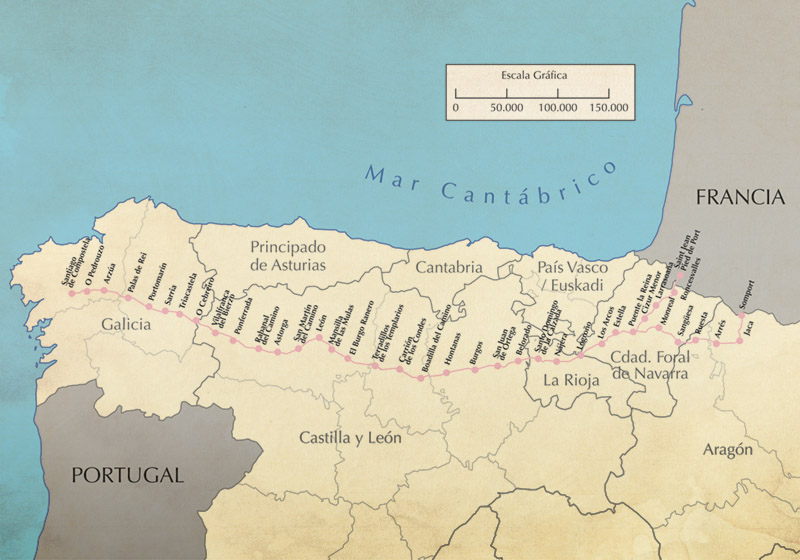
‘How can this be?’
Yerger was 55 years old when she went in for a routine mammogram. Because she has dense breast tissue, she also had an ultrasound. Neither revealed any abnormalities in her breasts. Two months later, her doctor recommended a DEXA bone density scan to get a baseline of her bone mass should she develop osteoporosis as she aged.
“It’s your road and yours alone. Others may walk it with you, but no one can walk it for you.”
— Rumi
“The doctor called and said, ‘We see something strange in your hip. We’d like to get an X-ray,’” Yerger says. “I didn’t think too much of it. A few days after the X-ray, my doctor called again to tell me, ‘You’ve got something really, really not right going on in your bones. It looks like multiple myeloma, which is bone cancer. This is more important than anything you have happening right now. We need to get you to the oncologist within the week.’”
She underwent blood tests for multiple myeloma, which came back negative. Her physicians were stumped because the tests weren’t matching what they saw in Yerger’s scans. It didn’t make sense to Yerger, either. How could her bones be in such bad shape when she hadn’t felt unwell or weak or abnormal at all? In fact, she felt completely fine. It took a bone biopsy to confirm a diagnosis: stage four lobular breast cancer.
“That was a surprise,” Yerger says. “I thought, ‘That can’t be right.’ I just had a mammogram and an ultrasound. They had told me everything looked great. How can this be?”
She was told that sometimes the cancer can be really small in the breast and just metastasize elsewhere in the body. That her bones had probably been riddled with cancer for a long time. The density of her breasts made her cancer difficult to detect on mammograms and ultrasounds. It was all quite disconcerting for Yerger, who made an appointment with the Mayo Clinic to get a second opinion. Her original diagnosis was quickly confirmed.
Yerger has not undergone traditional cancer treatments such as surgery, chemotherapy, or radiation — measures taken to prevent cancer from spreading beyond the breasts. Because cancer had already invaded her bones, Yerger was prescribed a hormone therapy drug to eliminate estrogen from her body and a cell growth inhibitor to halt the cancer’s growth. Her cancer has been in remission since November 2017, but there is no way to know how long that will last or what treatment will be prescribed next.
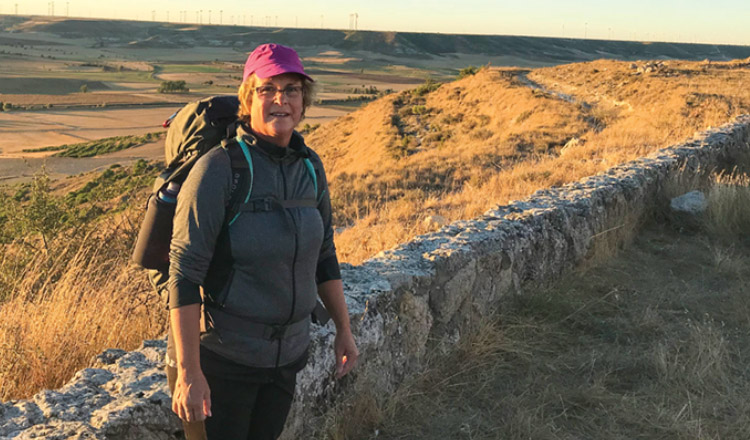
‘What’s really important?’
It was the lack of certainty about her future and how much time she had left before her cancer began affecting her daily health that led Yerger to walk the Camino de Santiago Francés, the most heavily traveled route among a network of trails across Europe that lead to Santiago de Compostela in northwestern Spain.
Camino means “the way,” and the Camino de Santiago is the Way of St. James. Legend holds that the apostle’s bones lie within the cathedral in Santiago de Compostela. Christians have been following the Way for more than 1,000 years, but the lore surrounding its roots points to an origin more ancient than that. It’s believed that earlier pilgrims traversed the Camino as they followed the Milky Way to Fisterra (Finis Terrae), which Romans believed was the end of the earth. Fisterra is also believed to be the site of Ara Solis, an ancient altar dedicated to sun worshipping created perhaps by the Phoenicians or Celtic tribes. In this alluring place along the rocky coast, primeval cultures believed the land of the living touched the land of the dead.
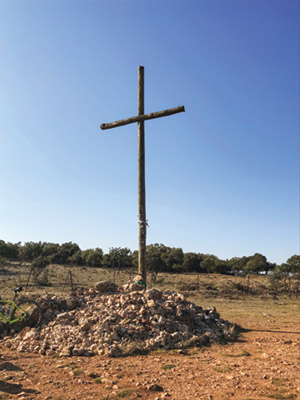
Yerger realized if she were ever going to hike the Camino, now was the time. She wasn’t feeling sick, at least not yet. She had walked 12 miles on vacation and felt fine. She worked with the Mayo Clinic Healthy Living Program to develop a diet and exercise routine tailored to her goals, which included back and shoulder strength training so she could carry a 20-pound backpack. She began taking eight-mile walks around her neighborhood. Three weeks prior to leaving for Spain, she enlisted two friends to help put her endurance to the test. They drove an hour from Yerger’s home in Hawthorn Woods, Illinois, to Lake Geneva and walked around the lake in one day — 24 miles, longer than any of her days would be on the Camino. Though her friends helped prepare her for the journey, she was determined to embark on the Camino alone.
“I wanted to walk the Camino by myself because I needed some space and time to figure out how I wanted the rest of my life to be,” Yerger says. “Getting a diagnosis of stage four breast cancer is a big wake-up call to make changes in your life. I wanted the freedom to think about, ‘What do I want to do? What do I want to accomplish? What’s really important? What am I going to hold on to? What am I going to let go of?’ These are good questions to ask ourselves regardless, but when you are faced with a devastating diagnosis, it really does come to the forefront.”
Yerger wanted her journey to serve a larger purpose, so she partnered with the Mayo Clinic to raise money and awareness for molecular breast imaging (MBI) research. The technique, pioneered at Mayo Clinic, nearly quadruples the detection rates of breast cancers in women with dense breast tissue; however many women don’t know to request the advanced screening because the technology is not yet widespread.
“We’re not where we ought to be with breast cancer screening technology,” Yerger says. “A lot of cancers are missed for the same reason that mine was. So I’ve dedicated myself to teaching, writing, and speaking about my journey and advancing breast cancer screening. I want to create a movement among women so they understand their breast density and are educated and empowered to ask for the tests that they really need and want and deserve.”
‘It’s a pilgrimage’
Her journey on the Camino began on September 16, 2018, from Saint-Jean-Pied-de-Port, a small market town that straddles the French and Spanish border at the foot of the Pyrenees. She planned to walk about 15 miles each day.
“That first day leaving Saint-Jean-Pied-de-Port is the hardest,” Yerger says. “It’s hardest because it’s the first day, but it’s also just really grueling. It’s a 4,000-foot climb into the mountains and then a descent almost all the way back down into Roncesvalles, Spain, at the end of the day. It’s a big one, that first day. But when it’s over, you feel like, ‘Hey, if I did the first day, I can do all the rest.’ It gives you confidence.”
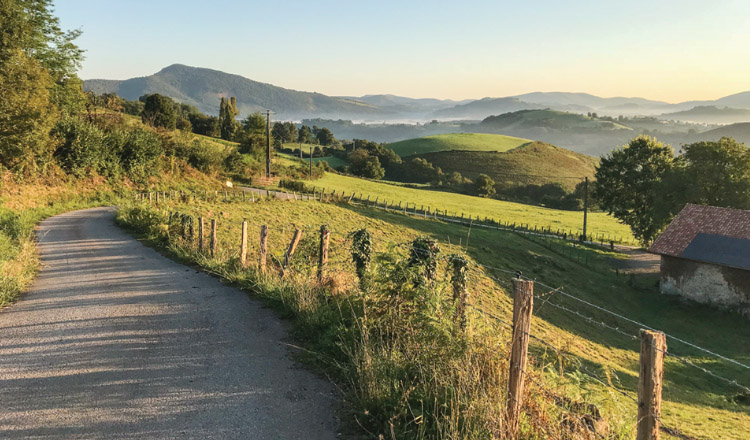
Although she set out on the Camino alone, Yerger quickly realized the pilgrims along the Camino form their own community of wanderers. Most stay in accommodations along the route called albergues, community hostels with a bar on the first floor and rooms with anywhere from 10 to 100 beds upstairs.
“It’s a pilgrimage,” Yerger says. “People have been walking that trail for more than 1,000 years. It’s an ancient rite, and you start to feel that you’re just one of many passing through the planet. I just happen to be here in this moment, but many, many people have passed through before me, and many, many people will pass by after me. When you start to think about how you’re just a small part of the universe, your everyday worries become less important.
Listen to your heart and it will show you the way.
—Camino saying
“Everyone is doing the same thing, so there’s a real sense of community and trust. There’s nowhere to lock up your stuff. You just have a small area by your bed. There’s so much trust in your surroundings, and it’s very relieving. It takes your stress right down because there’s no, ‘Did I lock the car? Did I leave the windows down?’ All those little worries are just gone.”
During her 40-day journey, Yerger found herself making promises to herself for changes she would make once she returned home, such as being more frank with her words and not striving so hard to be a people pleaser. One of her major breakthroughs came while walking the meseta, the expansive plains of central Spain.
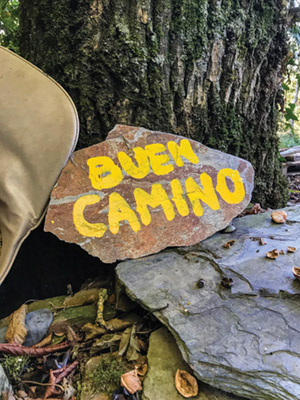
“It is flat and lonely,” Yerger says. “There’s hay and wheat all around as far as the eye can see. The sky is beautiful. No one else is around. And I came to some peace with not knowing my future, not knowing how long these drugs will be effective. I decided I wouldn’t let not knowing about the future rob me of the joy I would have today.”
Everyone has their own reason for walking the Camino. Yerger started her journey with a desire to reckon with the uncertainty of her future living with breast cancer. By the time she reached Fisterra, she watched the sun disappear into the Atlantic Ocean, determined to dedicate her life to do what she could to prevent other women from facing a similar fate.
“We have mammograms, and they have helped a lot of people,” Yerger says. “But now we’ve plateaued, and we need to make that next leap, and we know how to do it, but it’s not happening. So maybe I am part of that movement that helps women understand what’s going on and demand better screening so we begin to see more access to better technology that can help us.
“Maybe that’s my calling. It’s almost crazy to say it. The next thing that pops into your head is, ‘Well, who am I to do that?’ But who am I not to? Maybe this is my destiny.”
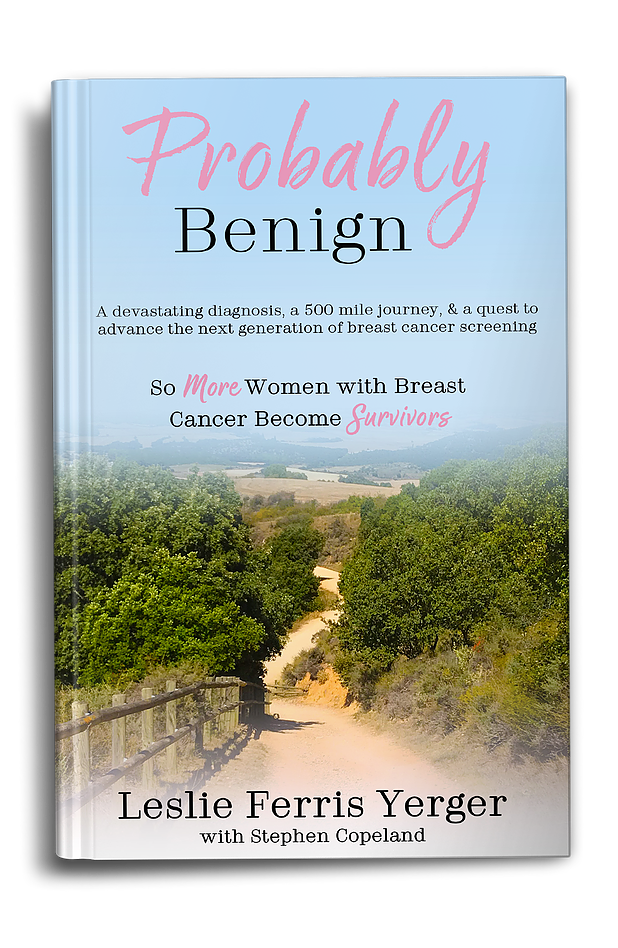
Read the Book
Learn more about Leslie Ferris Yerger’s journey in her new book, Probably Benign. Order online at probablybenign.com.

